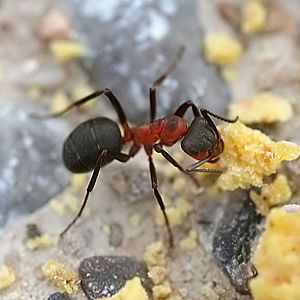Formic acid facts for kids
Formic acid, also known as methanoic acid, is the simplest type of carboxylic acid. Its chemical formula is HCOOH. This means it's made of one hydrogen atom, one carbon atom, and two oxygen atoms.
Many animals use formic acid for defense. The name "formic" comes from the Latin word for ant, formica. This is because it was first found by distilling ants. In many languages, its name means "ant-acid," like mierenzuur in Dutch or Ameisensäure in German.
History of Formic Acid
People have known about ants using an acidic liquid for defense for a long time. In the 15th century, many alchemists wrote about this.
The first person to actually get formic acid was an English naturalist named John Ray. In 1671, he managed to get it by distilling ants.
Where Formic Acid is Found
Formic acid is found naturally in many places.
In Nature
- Ants: Most ants produce formic acid. Wood ants from the genus Formica can spray this acid. They use it to attack their prey or to defend their nest from danger.
- Stinging Nettles: You can also find formic acid in the tiny hairs (called trichomes) of the stinging nettle plant. This is what causes the stinging sensation if you touch them.
- Atmosphere: Formic acid is also a natural part of the air around us. It mainly comes from forests.
See also
 In Spanish: %C3%81cido f%C3%B3rmico para ni%C3%B1os
In Spanish: %C3%81cido f%C3%B3rmico para ni%C3%B1os
 | Aaron Henry |
 | T. R. M. Howard |
 | Jesse Jackson |


